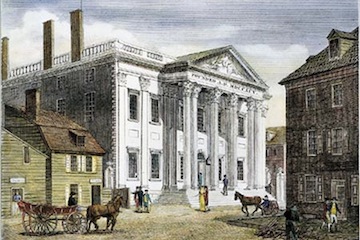The Necessary and Proper Clause and the First Bank of the United States
 The First Bank of the United States, established in 1791, was an early point of contention over the meaning of the Constitution (click for source)
The First Bank of the United States, established in 1791, was an early point of contention over the meaning of the Constitution (click for source)
A number of Constitutional scholars maintain that cases should be decided according to the original intent of the framers. However, it is not always so easy to determine precisely what this intent was. Different thoughts prevailed among different delegates to the Constitutional Convention, and some clauses were worded so vaguely as to finesse vast differences of opinion. The Necessary and Proper Clause in Article I, Section 8 of the Constitution is exemplary. After listing a number of powers necessary for a functioning government, the Constitution states, "The Congress shall have Power ... To make all Laws which shall be necessary and proper for carrying into Execution the foregoing Powers, and all other Powers vested by this Constitution in the Government of the United States, or in any Department or Officer thereof."
Federalists argued that the Constitution would be useless without some provision granting broad latitude to Congress in resolving the nation's problems. Anti-Federalists saw a loophole through which all manner of potentially odious legislation could find a legal foundation. This was one of the concerns addressed in the Federalist Papers. In Federalist No. 44, James Madison wrote, "No axiom is more clearly established in law, or in reason, than that wherever the end is required, the means are authorized; wherever a general power to do a thing is given, every particular power necessary for doing it is included."
The different opinions about what this clause meant were evident as early as 1791. Alexander Hamilton and George Washington supported the establishment of the First Bank of the United States, while Madison, Thomas Jefferson, and others saw the bank as unconstitutional. Both sides argued about the meaning of the Necessary and Proper Clause to support their case. Hamilton argued that the government could not exercise other powers granted in Article I without the presence of a national financial institution. For instance, Hamilton asked how the government could be expected to collect taxes, regulate interstate trade, or provide for the common defense without the help of a national financial institution.
Madison and Jefferson argued that nothing in the Constitution explicitly authorized the creation of a national bank, and that applying the Necessary and Proper Clause to this purpose was a gross misreading of its meaning. Since the Bank would have the power to regulate state banking practices, they argued that it was a usurpation of the Tenth Amendment, and that banking was a power properly delegated to the states. They also argued that a loose interpretation of the Necessary and Proper Clause could eventually allow the federal government to do almost anything, and would defeat the purpose of constraining the government with the Constitution in the first place.
Twenty years later these Constitutional questions were still unresolved. When the charter of the First Bank of the United States came up for renewal, the Senate vote ended in a tie. George Clinton, Vice President to James Madison, delivered the tie-breaking vote against renewal, and the Bank was relegated to the history pages. The Second Bank of the United States was also not immune to this controversy, ultimately meeting the same fate in the 1830s. Whigs continued to advocate for a national bank thereafter, until issues of slavery took immediate precedence. Finally, in 1913, the Federal Reserve System was created, and seems to be well-entrenched as of this writing.
National banking is hardly the only area affected by the Necessary and Proper Clause -- it was simply one of the earliest to arise. Judges and Constitutional scholars have debated for the entire life of the United States exactly how far the Clause can be stretched, and under what circumstances it applies. In any case, the question of what laws are Constitutional, or what the original intent of the framers was, is one fraught with difficulties. There is rarely an easy answer for it.